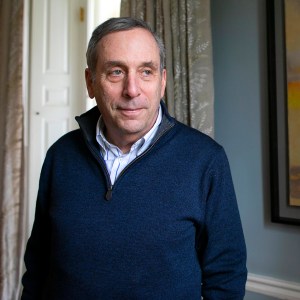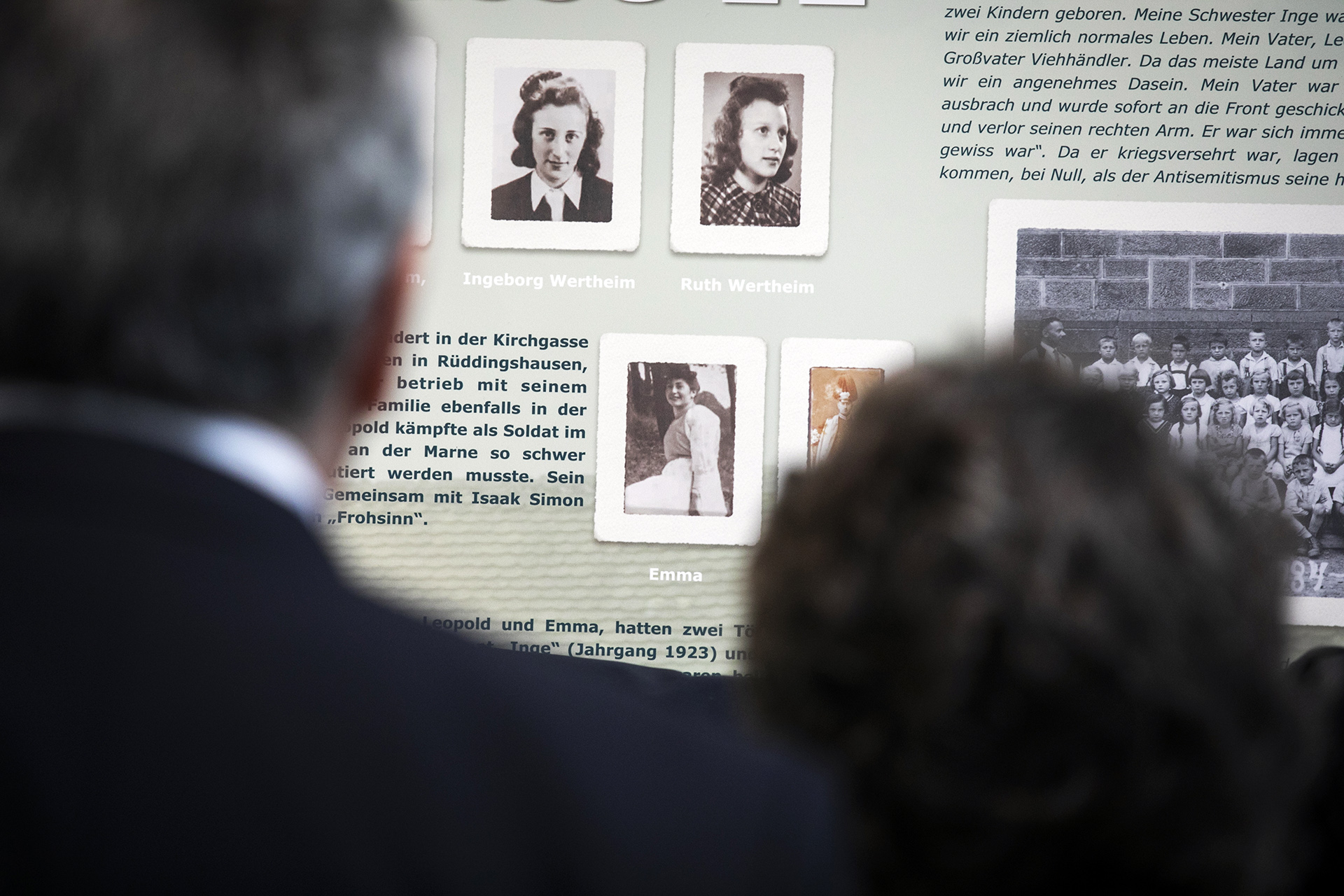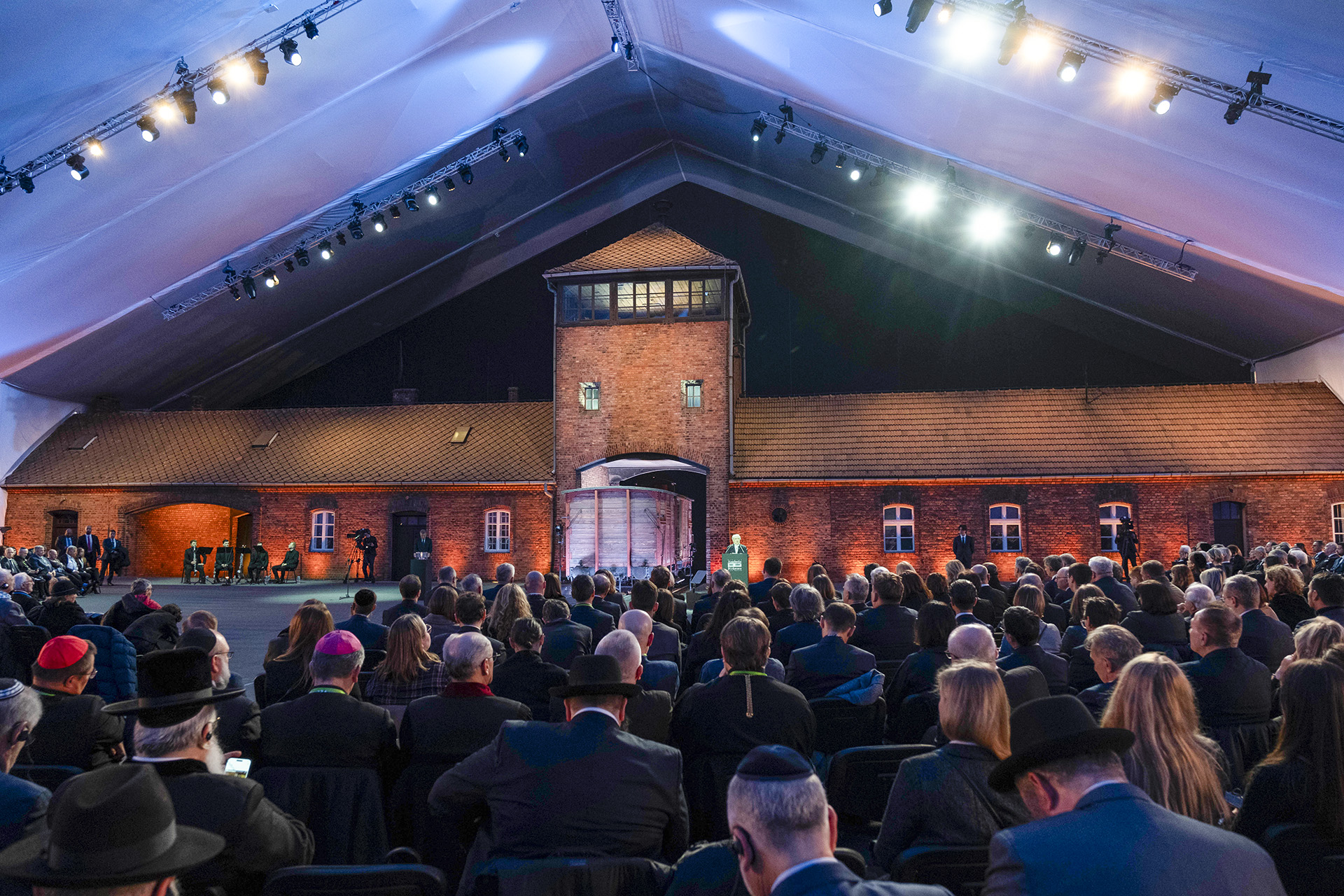Larry Bacow’s mother, Ruth Wertheim, was 15 when she was sent to Theresienstadt concentration camp in the Czech Republic. Two years later, she was sent to Auschwitz, where she was separated from her parents, and subsequently moved to Merzdorf in Germany. Wertheim, the only member of her family to survive the war, was 18 when her camp and Auschwitz were liberated in 1945. A year later, she came to the U.S.
Former Harvard President Bacow joined world leaders, official delegates, and survivors on Jan. 27 as a representative of the University in a solemn ceremony commemorating the 80th anniversary of the liberation of Auschwitz in southern Poland. The site, where the Nazis murdered nearly 1 million Jews, has become an enduring symbol of the Holocaust and is now a museum and memorial.
In this edited conversation with the Gazette, Bacow spoke about the event, his first visit to the Auschwitz complex.
Can you tell us about your family’s connections to the Holocaust?
My mother was the only member of her family and the only Jew from her town, Londorf, Germany, who survived the war. I never really talked much about my mother in my professional life until I became president of Harvard in 2018. That was a time in which the government was showing increasing hostility toward immigrants as well as refugees, and I thought it was important for people to understand that those who come to this country from abroad typically do so for a variety of reasons.
One is simply to seek a better life for themselves and their children. They also come in search of religious freedom, and they may not have much in the way of resources. They may not speak the language, but they have a fierce determination to provide a better life for their children than they would have if they had remained behind.
Both of my parents were refugees. My father was born in Minsk in Belarus, and he came before the war, but my mother came after the war, so I started talking about it.

“How could she have lived through this experience and not been totally traumatized by it?”
transcript
Larry Bacow: “I once asked her, ‘How could she have lived through this experience and not been totally traumatized by it?’ She was 15 when she went into the camps, 18 when she was liberated. She said, ‘At that point, Hitler had taken from me everything that I cared about: my parents, my friends, my entire family, our home, our possessions.’ She said, ‘I could have been angry or bitter for the rest of my life, and Hitler then would have deprived me of everything else, or I could live well, and that would be my revenge.’ And that was my mother. She was an amazingly resilient and strong person.”
Was this your first time in Auschwitz?
Yes. I had avoided going to any of the death camps previously. It was too close. My earliest memory as a child is my mother waking up in the middle of the night with a nightmare. I was 4 years old, and she was only nine years out of Auschwitz.
Having said that, my mother was a really remarkable woman, because first of all, she was very optimistic, determined, and forward-thinking; she was everyone’s favorite aunt. Everybody loved my mother. I once asked her, “How could she have lived through this experience and not been totally traumatized by it?” She was 15 when she went into the camps, 18 when she was liberated.
She said, “At that point, Hitler had taken from me everything that I cared about: my parents, my friends, my entire family, our home, our possessions.” She said, “I could have been angry or bitter for the rest of my life, and Hitler then would have deprived me of everything else, or I could live well, and that would be my revenge.” And that was my mother. She was an amazingly resilient and strong person.
How did the ceremony affect you personally?
When Alan Garber invited me to represent Harvard at the 80th anniversary of the liberation of Auschwitz, I thought this was something that I needed to do. In some ways, it was an opportunity to physically bear witness to the atrocities that had been inflicted upon my mother and her family, and so many others.
What made the trip particularly poignant is that Auschwitz was liberated on Jan. 27 of 1945, and my mother passed away on Jan. 27, 1994, so this was the anniversary of my mother’s death. I just felt like I had to do this. This was important, especially at a time in which antisemitism is rising throughout the world. I was with two dozen heads of state who attended and other delegates who were there to make a statement that this should not and cannot happen again.

In 2022, Bacow attended a Holocaust memorial in Londorf, Germany, the hometown of his mother, Ruth Wertheim. Her photo is on display, center right.
File photo by Stephanie Mitchell/Harvard Staff Photographer
What were the most moving aspects of the ceremony for you?
There are commemorative events every five years. At this year’s commemoration the only speakers were Auschwitz survivors. This being the 80th anniversary, the organizers recognized that five or 10 years from now, there are likely to be no remaining survivors. The focus of the event was on the testimony of survivors. They were the only ones who spoke, other than the heads of the foundation and the museum, each of whom gave brief remarks.
Each of the survivors was quite elderly, in many cases quite frail, and some were using walkers and canes. They needed to be assisted to get to the podium, but that made their testimony that much more powerful — that they were determined for the world to know what happened and what happened to them. There’s a quotation that’s often attributed to Stalin, “The death of one man is a tragedy, the death of millions is a statistic.” Hearing the survivors’ stories made a number that’s otherwise incomprehensible very, very real. It was extremely, extremely moving.
There were also a few additional poignant moments. We all took shuttle buses from a parking lot to get to the event. It wasn’t a long trip, maybe eight or nine minutes. The buses were quite crowded, with most people standing, and as the buses drove in, we passed a cattle car in part of the preservation area in Auschwitz. I couldn’t help but think: Here we were in a bus that had heat, and although we were closely packed, it was nothing in comparison to those in which people who were deported to Auschwitz faced. There were hundreds of people crammed into these cattle cars, in many cases, without food or water, or even space to lie down.
I was also struck at the end of the ceremony, when we all rose to be led in prayer. There’s a prayer called Kaddish that Jews say for loved ones who have died on the anniversary of their death. This was the anniversary of my mother’s death, and saying it there, where the ashes of her family were literally scattered, was something I will never forget for the rest of my life.
“Hearing the survivors’ stories made a number that’s otherwise incomprehensible very, very real.”
My mother talked about how she was separated from her parents as they went directly to the crematorium. I was also impressed by the commitment of those who had worked so hard to preserve this memory and to preserve Auschwitz itself. They were not Jews. They were Poles. I think they are to be commended for their good efforts.
What role can universities play in preserving the memory of the Holocaust?
Our motto is truth, Veritas, and this is a time in which people continue to deny the existence of the Holocaust, where major leaders suggest that the time has come to turn the page and stop focusing on what the Nazis did.
It’s in these times that universities have a role to play by helping to preserve the record and to teach what actually happened. There were many Holocaust scholars who were represented at the event. Ronald Lauder, who is the chairman of the Auschwitz-Birkenau Memorial Foundation, pointed out that five years ago, at the last commemorative event, it was unthinkable that the world could be awash in antisemitism as it is now.
He said, “All the more reason to capture these stories, to document them, to preserve Auschwitz for posterity.” The entire Auschwitz death camp is preserved as a museum, and the Polish people deserve enormous respect for having done that.
There was one speaker who quoted a survivor who had spoken at the 70th anniversary of the commemoration of Auschwitz, someone by the name of Roman Kent, a Polish Holocaust survivor who is no longer alive. Kent’s quote really captured the purpose of the event. He said, “We cannot let our past become our children’s future.” For me, that sums things up quite well.
Source link

